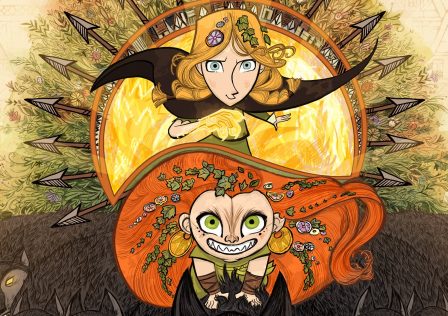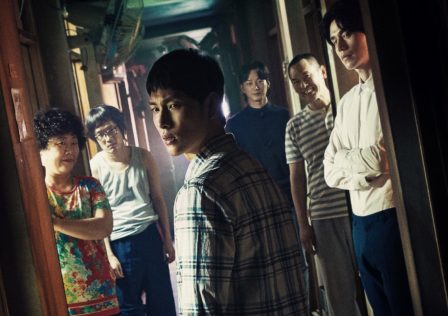What’s the meaning of Alex Garland’s 2018 science-fiction movie Annihilation? A lot of things, actually. And what it means may differ from me and you.
That’s probably not the answer you’re looking for. I’m not sure that there’s a true answer. When we talk about films like Annihilation, we need to accept that some films have multiple meanings.
I often think of 2017’s Mother! when I broach this subject. Mother!, directed by Darren Arronovsky, also has multiple meanings, and not one of them is the One True Meaning. In fact, in its own mad brilliance, it’s one of those film that is made up entirely of allegories. It’s a biblical play as much as it is about the relationship of an artist and his muse (or, if you like, Darren Arronovsky’s own relationship with his star and then-girlfriend Jennifer Lawrence). That’s the point of the film. You’re meant to find your own answer, if not accept all of them.
Annihilation is the same, in that each of us will find a different meaning. None of them will be wrong. They can all be correct. That, perhaps, is part of the beauty of this film.
So, really, I can only tell you what Annihilation means to me. First, though, I’m going to tell you what the film is about.
DESTRUCTIVE SPOILERS AHEAD.
Are we good? Are you ready? Right.
Annihilation is about Lena, played by Natalie Portman. She’s an ex-military biologist whose military husband Kane (Oscar Isaac) went missing during a mission and presumed KIA. She’s rightfully sad, a little angry perhaps. Then he pops back home, 12 months later, except now he’s weird and distant. He starts vomiting blood. Before she knew it, they’re both taken to and locked up in a science facility.
Turns out, her husband was part of an expedition into Area X, a large plot of land behind what’s called the Shimmer, a translucent wall that originated and grew from a meteor that crashed into a lighthouse. Determined to find out what really happened to Kane and hoping, perhaps, to save him, Lena joins an expedition of women scientists to venture forth towards the lighthouse. It’s a motley crew of people with their own rather dark pasts, led by the mysterious psychiatrist Dr Ventress (Jennifer Jason Leigh), tough-talking Anya (Gina Rodriguez, from Jane the Virgin), meek Josie (Thor Ragnarok’s Tessa Thompson) and sweet Cassie (Tuva Novotny).
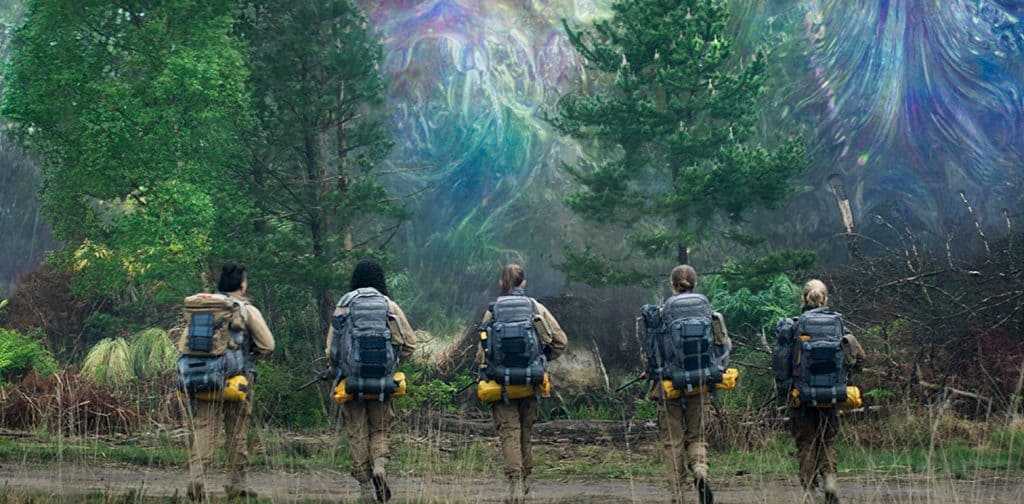
Ready to science the hell out of the Shimmer
In Area X, things are bizarre and beautiful. Due to the strange properties of the Shimmer, the local plants and wildlife have their DNA refracted to one another, turning everything into mutant hybrids. Crocodiles may have shark teeth. Plants grow different flowers from the same stalk. And the humans, well, they’re a-changin’, too, and not for the better.
Things go wrong quickly, of course. Cassie gets taken and killed by a bear-like creature, while Anya’s sanity began to dwindle. Lena’s secrecy around her husband’s expedition to Area X causes drama. One by one, the scientists perish, and Lena becomes the only person left. She reaches the lighthouse, and faces the thing that came with the meteor – an alien creature which began mirroring her form.
She tricks it into immolating itself with a phosphorous grenade, and the alien proceeded to burn the lighthouse and, somehow, destroy the Shimmer. Lena returns to the science facility, where she is locked up and interrogated, telling her story to Benedict Wong. She is reunited with her husband, who is not vomiting blood now, except this may or may not be Kane, but an alien doppelganger. As Kane and Lena embrace, their eyes glow, and the movie ends in a credits scene depicting the merging and splitting of cells.
It’s all very confusing, and it sounds kind of silly when I tell it like this. That, however, undermines the moviemaking prowess of writer-director Alex Garland, who creates an atmospheric film with tension intermingling with mystery, and who masterfully provides information as we need them, letting us piece things together along and about the characters. It’s a gorgeous film, with things both terrifying and beautiful.

Emphasis on the “terrifying”
So what does the movie mean to me? I think it’s mostly about the self-destruction tendencies of humankind. It’s one of the running themes of the characters. Lena has a loving husband, but his constant absence in her life led her to have an affair – she even continues it after she believes her husband knows about it. Kane, after learning about the affair, essentially threw himself into a suicide mission. No expedition ever came back from beyond the Shimmer, after all.
The all-women expedition crew have been alluded to be rather self-destructive as well. All of the girls have issues that serve as a primary motivation for them to head into an expedition with no way back. Cassie lost her daughter, and in the process lost her sense of motherhood. Anya was a former addict (either drugs or alcohol, it wasn’t clear). Josie wears long sleeves to hide her suicide scars. And Dr Ventress is dying of cancer, after living a life of no friends, family and children. It’s unclear if Lena is making the journey to save Kane or if she’s self-destructive herself. In a flashback, the man she cheats with says she hates herself. She more or less agrees.
This aspect of self-destruction is alluded to with Ventress’ conversation with Lena during one night:
“…I think you’re confusing suicide with self-destruction. Almost none of us commit suicide, and almost all of us self-destruct. In some way, in some part of our lives. We drink, or we smoke, we destabilise the good job and a happy marriage. But these aren’t decisions, they’re… they’re impulses.”
It’s like we made a God in our own image. And a God in our image could only be destructive.
In a way, all of the main characters are in Area X looking for some sort of reprieve, but it’s unclear if everyone found it. Cassie dies when she was attacked by the bear-like creature, her fear eventually refracted into the monster which can then call out in her voice and last words (“Help me!”) – reflective of how her daughter’s dead is forever imprinted in her, changing her forever.
Anya perishes after her paranoia gets the better of her – as her mind crumbles, her behaviour and distrust is reminiscent of someone dealing with withdrawal, unable to trust her mind. Josie seemingly accepts her fate that there’s no leaving Area X – as she walks away from Lena, flowers and plants grew from her suicide scars. The movie largely implies that she turns into a one of those plants that grew into human shape. Perhaps she found her peace.
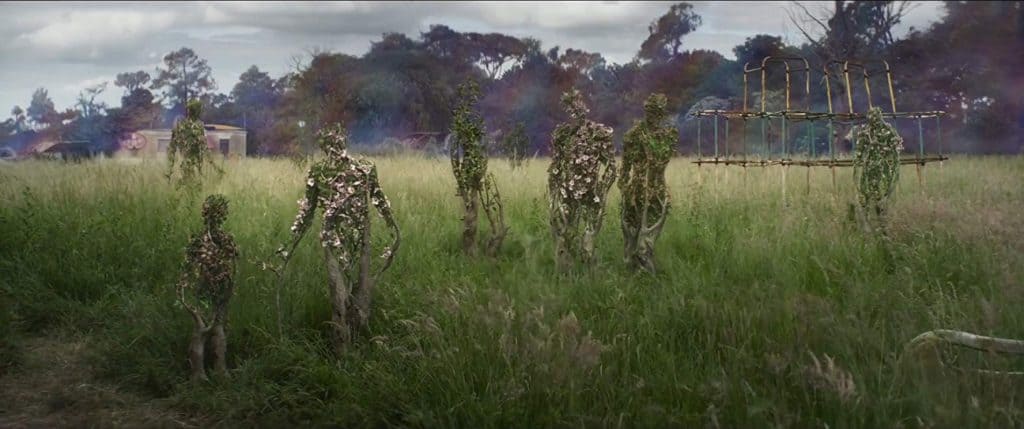
Quick, Josie, make like a tree!
Ventress, having entered Area X in search of truth before she dies of cancer, perishes with the alien erupting from inside her, having invaded her like the cancer in her body. And, if we’re to accept the possibility that Lena and the alien has swapped bodies, then it’s likely Lena’s own decision to stay and immolate herself.
When the phosphorus grenade went off, notice that the alien stopped mirroring Lena’s movement, but had stood there, as though accepting its fate. Notice that it first deliberately spread fire to the remains of Kane, then the roots around it, and then the entirety of the lighthouse and the Shimmer. Lena, perhaps, destroys everything she touches.
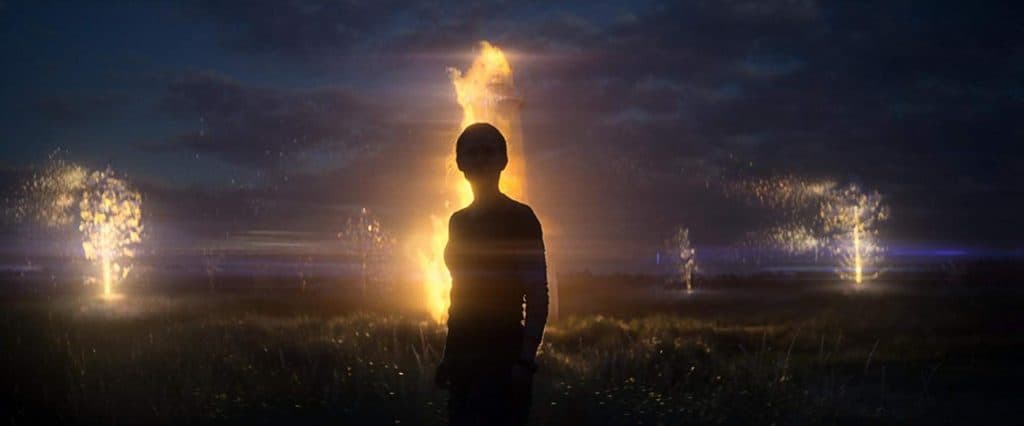
This is likely the alternate timeline when Padme becomes Darth Vader
The movie ends on a potentially downer note. If the Lena at the end is a doppelganger, then it is the doppelganger that has imbued with it the self-destructive tendencies of real Lena. The annihilation of Earth is yet to come.
This is only but one interpretation of Annihilation. One can, perhaps, read the movie as an allegory of godhood. At the beginning of the movie, Lena talks about how all cells on earth originated from one single cell. If God makes humankind in Its own image, then God is the original cell that splits itself into two, eventually forming all life on Earth.
The alien that arrived could be just that – one single cell, grown by adapting and refracting all of Earth’s own properties, including humanity. It’s like we made a God in our own image. And a God in our image could only be destructive.
We could go on and on. There will be many questions and many answers. And sometimes that’s it. That’s the point of the film. To ruminate and decipher and guess. To form our own hypothesis, because the One True Answer is always elusive, and we make do with the one that satisfies us most.
Also published on Medium.

makes it a life goal to annoy everyone with random Disney trivia. When he’s not staring at a screen or holding a controller of some sort, he is thinking about curry noodles. Like right now.

